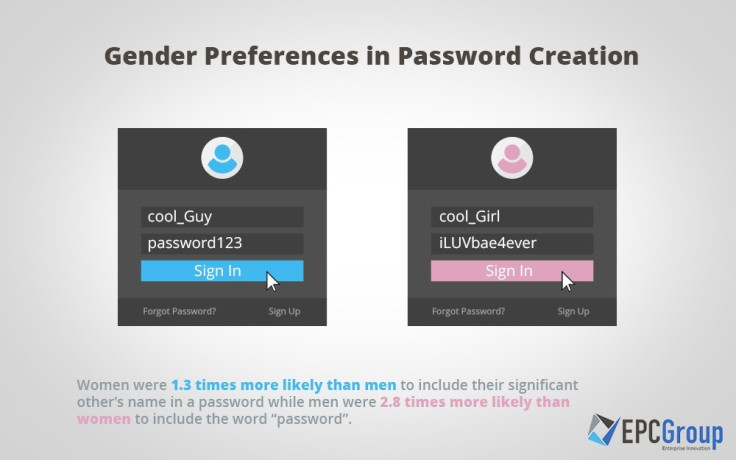Men are more likely to use 'password' as their password while women prefer their lover's name
A new survey has found women also prefer wordier passwords.

As hacks, data breaches and leaks become increasingly frequent and widespread in recent years, security researchers have continued to bemoan users' terrible password management habits. Despite that, people still continue to rely on weak, easy-to-remember strings of characters to secure their online accounts and digital identity.
While the worst passwords of 2017 expectedly featured some terrible options, including "123456" and "password", a new survey by tech consultancy EPC Group offers a rather different glance at people's notoriously awful and lazy password habits.
Despite "password" constantly topping surveys as the riskiest password one could use, the survey of 600 Americans in November found men seem to have a strong preference for this particular unsecure option.
According to the survey, men were 2.8 times more likely than women to use the word "password" as their password. Meanwhile, women were 1.3 times more likely than men to include their significant other's name in a password.
Women also tend to have wordier passwords and are 1.5 times more likely than males to use four or more words when creating a password.
The most common personal tie used by Americans when creating a password is the name of a pet, while the least common is their social security number. While people in western US states were more likely to use a sports team's name in the password, those in the northeast shared their passwords with five or more people more often when compared to citizens in other parts of the country.
"The most common personal tie that Americans use when creating a password is the name of a pet. The least common is their social security number. 33% don't use any of the typical personal information when creating a new password," EPC noted.

A little over 37% of those surveyed admitted that they only change their passwords when a website requires them to do so. About 16% said they change it once a quarter, while 10% said they never do so.
Around 11% of respondents admitted using the same passwords or variations of it for seven or more years.
Users' password storage habits were also found to be pretty dicey.
Despite fervent advice from experts and researchers to remember and store passwords safely, a shocking 43% of respondents said they write down their passwords and have that list somewhere near their computer. While 36% have their list of passwords locked in a safe, 13% have it on a password-protected document. About 8% have it saved in an open document on their computers.
"Password security is essential in order to protect your identity and safeguard yourself from risk," EPC Group said. "Make sure to not use personal information when creating a password, don't share it unless necessary, don't store it on your computer, and remember to change it often."





